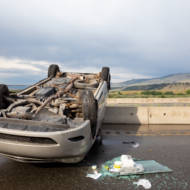
When terror strikes, every minute counts toward saving a wounded person’s life.
By Maayan Hoffman
When Tehilla Lancry-Smoler heard that the woman shot and nearly murdered by a Hamas terrorist earlier this month was her longtime neighbor and friend, Shira Ish-Ran, she felt helpless and scared.
“I was saying Psalms and just kept thinking, ‘What can I do?’” Lancry-Smoler recalled, thinking about the days following the Dec. 9 shooting at the Ofra Junction, which left Ish-Ran critically wounded. She was hit in the lower abdomen and pelvis and underwent surgery at a Jerusalem hospital, during which her baby – 30-weeks – was delivered in an emergency procedure.
By mid-week, Lancry-Smoler had her answer: she would donate blood to help compensate for the blood lost by Ish-Ran and the other six people who were wounded in the attack. However, when she went to the area blood bank to make her donation that afternoon, the medical team informed Lancry-Smoler that her blood pressure was too high and she would be unable to make the donation.
“It had never happened to me before,” Lancry-Smoler said. “I drank water, I sat down and waited, but I could not get my blood pressure low enough. So I left the blood bank and went home to my family.”
Lancry-Smoler, who grew up in Beit El as the next door neighbor of Ish-Ran, today lives in a community near the southern Israeli city of Ashkelon. After dinner that evening, Lancry-Smoler’s husband informed her that Ish-Ran’s premature baby had died.
“I broke down, just really broke apart,” Lancry-Smoler said.
Despite the late hour of the funeral, Lancry-Smoler insisted on attending the burial of the Ish-Ran baby. Their tiny baby, who was named Amiad Yisrael, wrapped in a tallit, was laid to rest in the ancient Jewish cemetery on the Mount of Olives.
“During the funeral, it was raining – God was crying with us,” Lancry-Smoler said. “Everyone was in tears. Everyone was drenched.”
When the funeral ended, Lancry-Smoler left Jerusalem to head back to her southern home. Some 20 minutes from her front door, her car’s tire hit an unidentified object. The car started to swerve and ultimately it flipped.
“I turned off the radio, I put on the blinker and I just sat there, the door on my head,” Lancry-Smoler recalled. “Within seconds, a religious man stopped his car to help – and then another one and another one.”
Lancry-Smoler tried to open the door, but at first she couldn’t. Finally, she prayed to God, “Please, help me, I need to get out.” And on the third try, she managed to push it a crack, just enough for her angel helpers to complete the job.
“I was bleeding so much,” she said. “I was all wet, and I thought it was the rain, but it was my blood.”
The men helped Lancry-Smoler to the side of the road, called an ambulance, removed all of her important belonging from the car, and waiting with her until she was transported to safety. When she arrived at the hospital bleeding and shaken, she discovered the miracle: with God’s help she had miraculously not only survived, but would leave the emergency room with just several deep cuts from the glass that shattered and got inside her hands and her face.
“There was an angel watching over me,” said Lancry-Smoler.
The road on which the accident occurred is narrow, and a bus or a truck would have run over her had it passed before her rescue; somehow, that night, the street was empty. The men appeared out of nowhere as saviors. And, most strikingly, she had not been allowed to give blood that morning, as if God knew she was meant to give blood that night.
“Before Shabbat, Shira Ish-Ran sent on WhatsApp a message that when Jewish mothers light their candles they should hug their children and tell them you love them no matter what,” Lancry-Smoler said. “I really connected to what she wrote. I went home to my four kids and I kissed them and I said, ‘Mom is here and you are fine and it is all OK.’”
Ish-Ran does not have her baby to kiss, Lancry-Smoler said through tears.
“God promised this land to us, He said it will be ours forever,” Lancry-Smoler said strongly. “No one will break us.”
She said that she wanted to give blood, because Ish-Ran lost so much on the more-than-30-minute drive from the site of the terror attack in the Biblical heartland to the hospital in Jerusalem. The massive blood loss is likely what led to the ultimate and untimely death of Ish-Ran’s three-day-old baby.
Now, Lancry-Smoler is supporting The Heart of Israel and its efforts to fun-raise for and build an emergency trauma room in Samaria. When terror strikes, every minute counts toward saving a wounded person’s life.
The lives of the people of Judea and Samaria are threatened by car rammings, drive by shootings, firebombs, stone hurling and stabbings. The Heart of Israel, together with the Benjamin Regional Council, is hoping to build an emergency trauma room with the latest life-saving technologies in the Biblical heartland. This way, when the next attack happens, lives can hopefully be saved.
Lancry-Smoler said she believes God saved her in the merit of Ish-Ran’s baby, in whose honor she wanted to give blood.
“I felt God was with me the whole time,” Lancry-Smoler said.
Make a donation to the emergency trauma center.
This article was written in cooperation with The Heart of Israel.
Source: United with Israel


